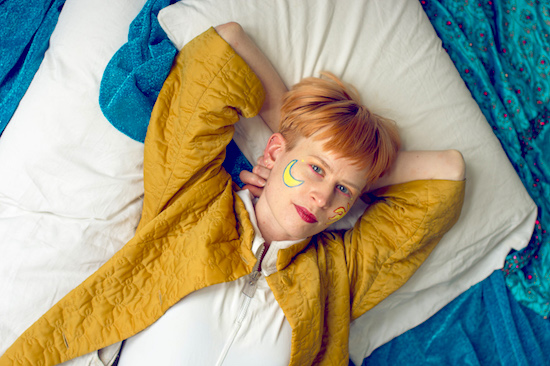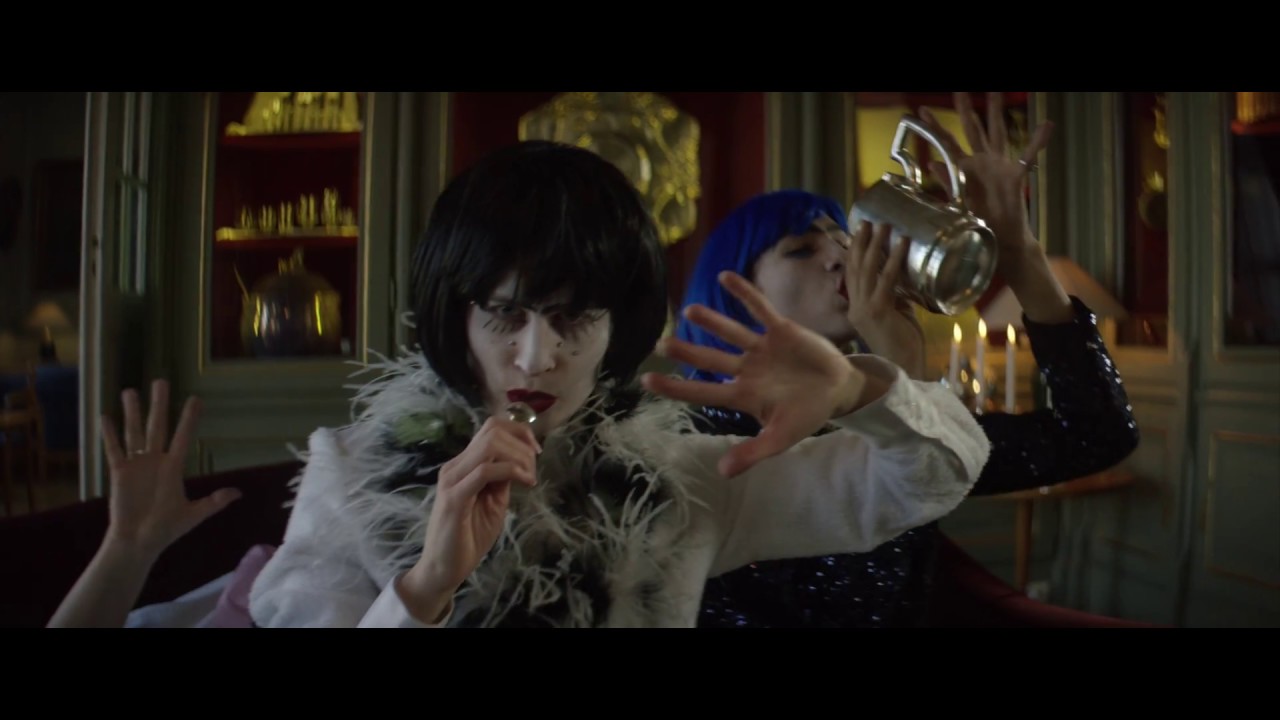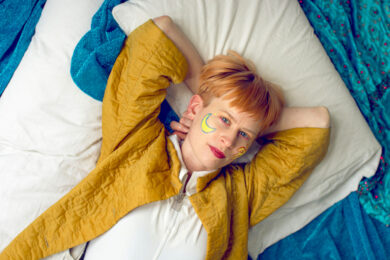There is, as you might expect from the title, something dreamy about this record. Dreamy in the sense that it’s soft and hard to translate into sensible waking language once it’s over, but also uncanny-and-Jungian dreamy. Things are going on, messages from your elsewheres and your submerged corners; it’s wispy and you can’t grab hold of it, and what is it trying to tell you?
The Long Sleep opens like a jazzy, frazzled sunrise, a slow and very beautiful dawn with the jazz musicians Hval has brought in – on piano, trumpet and saxophone – helping to create something wholesome and a bit Aaron Copland-ish, as if the day and the musicians are warming up, stretching out. The Long Sleep seems to begin with an awakening.
That first track is called ‘Spells’ – spells like periods of time, a rainy spell or a difficult spell that will eventually pass, but also, as in Morgan Parker’s brilliant poem ‘Slouching Towards Beyoncé: “I say spells because / I am magic.” Hval plays with words and phrases throughout the EP, repeats them and alters them, bends them around. There is a kind of playfulness or lack of guile, not a lack of skill but a disinterest in ‘mastering’ anything and an acute awareness of language, how it works and its limitations – how it doesn’t work – and how you can discover treasures inside the gaps.
The spell she’s singing here is: “You will not be awake for long / You won’t have to wait for long.” On the page it looks a bit like a threat, slightly sinister; it reminds us of what ‘the long sleep’ can refer to. “The cradle rocks above an abyss, and common sense tells us that our existence is but a brief crack of light between two eternities of darkness,” as Nabokov puts it in his memoir. “You will not be awake for long,” she sings, her voice clear and honest and just extraordinary, and a saxophone sigh exudes a sense of ineffable, indestructible wellbeing. It’s a soothing incantation, almost a morning-time lullaby. There’s a teasing too, an idea of how the great truths – birth! love! death! beauty! – are everyday and domestic. “We’ll meet in the smallest great unknown,” she says, later in the same track, as if to prick the pomp of any cosmic and universal theories – I see your great unknown, big guy, and I raise you a smallest great unknown.
There’s a teasing in this whole EP really – these aren’t even four distinct songs. Parts of the first track are reprised on the second track. And parts of that second song recur, like recurring dreams, no less, in the third song, ‘The Long Sleep’. And the final, fourth track is different (I’m told) on different formats. Like a dream, there is nothing to pin down here: “You are your own disco ball,” sings Jenny Hval at the start of the record, and it feels like a perfectly un-sensible and dreamy affirmation. She reprises the line in the next song but she’s not so sure now, she’s no longer convinced by her own daft analogy, her own faux profundity; this record is full of echoes and repetitions and each time (like a recurring dream) the mood or the meaning or the essence has shifted. There are fragments and feelings and impressions, and they change as they echo – they change even as you try to look directly at them.
Dreaming is unmediated; it’s so unmediated we barely know what it is that isn’t being mediated. “It’s not in the words,” Hval sings, on the second track and again in the third. “It’s not in the rhythm.” This album demonstrates an urge to express rather than capture, explore rather than explain; she uses words to tell us how inadequate words are, music to tell us how inadequate music is. It is light and substantial, full of death and full of hope, happy and sad; Hval is not fooled by binaries, basically, and the result is elegantly subversive. It is gimlet-eyed and hopeful.
The second track is a reprise of the first, with piano and singing so beautiful and graceful it can (let me tell you) make you weep; then it shifts to a stabbing, high-pitched chant – “This is the long sleep / This is the long sleep” – and a synthesized bucolic swirl, inducing that gut-deep almost-panic and that eerie not-quite-comfort you get from some of the very weirdest and most beautiful old English folk songs (old Norwegian folk songs too, for all I know). This one is called ‘The Dreamer Is Everyone In Her Dream’, and Hval’s voice seems to be repeated, layered into many urgent voices; it feels like they are all warning her, telling her, circling her and pointing. “The dream is the theatre where the dreamer is at once scene, actor, prompter, stage manager, author, audience, and critic,” wrote Jung (well, in German). Now, I’m not saying that Jenny Hval has definitely been reading Jung, and I’m not saying that Jung would definitely be bang into this EP; but I think she has, and I think he would.
The title track is the longest, at over ten minutes, a spooky centrepiece. It is a delicate uncanny improvisation (I think) that becomes almost solid about eight minutes in and then heads back into “that primeval cosmic night” (as Jung describes it), the place “that was soul long before there was conscious ego and will be soul far beyond what a conscious ego could ever reach”. It doesn’t have a conclusion but it does end, very suddenly, after final moments of graveyard chill winds and creaks that (we realise too late) should have signalled the track’s impending demise.
The last song – the one I have anyway – is another reprise, a brief reincarnation. ‘I Have Something To Tell You’ is one final blip, 90 seconds of talk and trying to get out of the dream, out of the album, directly into you. “What am I doing here? What are you doing here?” she says. “Are we communicating? Am I promoting?” She made this EP in a lull, a career quiet spot (”It’s an in-between-albums record,” she said recently, “to stay visible”), and this last track embraces that prosaic motive, turns it into another reprise, another honest message. Then she ends again, really this time (for now): “Thank you,” she says. “I love you.” The two most valuable and useful phrases, don’t you think, when it comes right down to it.




